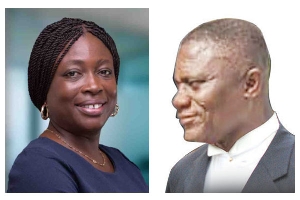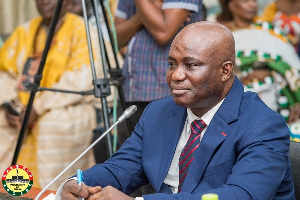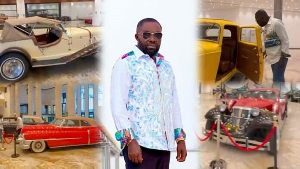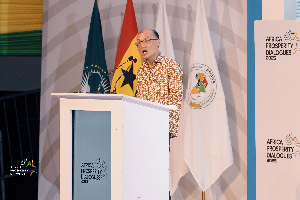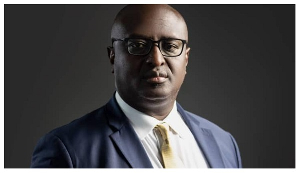Justice Aboagye Tandoh, the judge in the trial of former COCOBOD boss Dr Stephen Opuni and businessman Seidu Agongo, has declined to admit into evidence, a document lawyers for the accused persons say exonerates their clients of any wrongdoing.
The document in question is the statement written by the lead investigator at the Economic and Organised Crime Office (EOCO) when the state institution was "ordered" to curtail the investigation into fraud allegations against the accused persons.
The document spells out all the investigations and facts on written statements obtained when EOCO investigated the case led by Mr Paul Agyei Gyang, then the Head of the Organised Crime Unit.
It also included the fact that a second test conducted at the appropriate department at the Ghana Standards Authority proved that lithovit has the necessary ingredients which qualify it as a fertiliser, after a first test by the same Authority at a cosmetics department, which the investigator confirmed was not equipped to test fertiliser, gave a contrary result.
Prior to the unsuccessful attempt to tender the EOCO document, Mr. Agyei Gyang was made to identify the document as the "investigator's statement" he authored and signed as the head of the investigative team, which was handed over to the Ghana Police Service together with the docket.
"My Lord, we deal with case dockets; once the investigator writes his statement, it means the docket has been called for by any consumer of the docket. It could be the Attorney General, either a superior wants to peruse it, or it is to be handed over to a different person so that he can understand what the investigator has done so far," the EOCO investigator explained.
As a "seasoned investigator, " Mr. Agyei Gyang, currently at the Operations Directorate of EOCO as a Senior Staff, was asked to tell the court whether the Ghana Police Service and EOCO have standards or procedures for taking investigative samples for analysis.
This was his answer, "My Lord, in every sphere of investigation process, the principles of clarity, credibility and fairness should always be applied. And for that matter, depending on the exhibit to be tested, there is something called chain of custody that should be taken into consideration using what I have already told the court about, being clarity, fairness and credibility. Depending on the context and how the exhibit is found, these principles are very important."
He explained that it was based on these principles that, after Seidu Agongo objected to a test on a sample which was collected without his involvement, the management of EOCO "deemed it necessary that all parties be present for the selection of the [second] sample [from COCOBOD warehouse]".
Benson Nutsukpui, the lead counsel for Seidu Agongo, decided to tender the investigator's own statement in evidence. However, it was objected to by the prosecution led by Chief State Attorney Evelyn Keelson on Tuesday, February 20, 2024.
Her objection was influenced by a similar circumstance on December 5, 2023.
During cross-examination, after the witness admitted to authoring that document, Benson Nutsukpui sought to tender a document in evidence through the former Executive Director of CRIG, Dr. Gilbert Anim Kwapong.
That evidence was a statement the witness gave to police investigators when he was interrogated in January 2018. It was once tendered by counsel for the first accused, lawyer Samuel Codjoe, when he cross-examined the seventh prosecution witness, who happens to be the investigator, Police Detective Chief Inspector Thomas Prempeh Mercer.
The statement was tendered in an open court without any objection by the prosecution and was therefore marked as Exhibit 58.
However, the retired justice of the Supreme Court, Justice Clemence Honyenuga, who was then sitting on the case at the High Court, marked the admitted evidence as reject suo muto in his bid to establish a prima facie case against the accused persons in his ruling on the submission of no case.
Justice Aboagye Tandoh rejected the document, saying the court would "not discern into admitting, then reject and then admit".
Lawyer Benson Nutsukpui had then entertained the fear that if care is not taken, parties can conspire and tender evidence that exonerates another party through the wrong witness just for the court to reject exculpating evidence and place the same beyond the reach of the party it exonerates.
However, on Tuesday, in objecting to the investigator's statement, Evelyn Keelson reminded the court that the statement was one of the pieces of evidence Justice Honyenuga's court rejected.
"This statement is one of the statements which was rejected in the course of the trial judge's evaluation of the submission of no case. My Lord, in line with a decision my Lord has already given in respect of an earlier statement falling in the same category, indicating that your lordship would take a decision on the statement now that the witness has appeared before the court in the course of your evaluation of the evidence, my Lord, we submit that the same decision be applied to this case.
"My Lord, this was also rejected and marked as R, and my lord's earlier decision on a similar statement given by Dr. Anim Kwapong should apply," Mrs. Keelson argued.
Benson Nutsukpui also responded, "My Lord, the objection raised by the prosecution should be seen and put in the proper perspective. My Lord, the high court is a court of justice and must always be guided by the principles to do justice to all manner of persons that appear before it. Luckily, this court is not bound by that ruling, which I refrain from giving any name to today.
"My Lord, that is a ruling in which a judge ruling on a submission of no case set out deliberately to deprive the accused persons of any material and or evidence that is exculpatory of them. This court should not follow what was done; that court stated that the statements tendered by the police investigator and not objected to by the prosecution were hearsay evidence. And so, without giving a hearing to the parties, that court rejected the evidence and marked it rejected in his chambers; nothing can be further from an act of a court not wanting to do justice than that.
"Now, my Lord, at this point, you have the witness before you; he was the investigator, he wrote the statement, he signed it, and it is on the file of EOCO. The prosecution generously discovered it and gave it to us; there is nothing hearsay about this document. What the prosecution is asking you to do is that I'm bound by the wrong judgement of a court of coordinate jurisdiction. My Lord, the interesting part of this case is that, if even it was hearsay, the court never gave the parties the opportunity to bring the person who made the statement.
"Having tied our hands, we have brought the person who made the statement; he has not denied it; he has admitted it, and to say that some time ago it was rejected by a court of coordinate jurisdiction is totally unacceptable. My Lord, there is no law of practice which states that a document rejected suo muto by a judge in his chambers cannot be readmitted. The new normal is that a document that has been rejected for a purpose can be readmitted for another purpose. So, my Lord, what we are saying is that the position of the prosecution is not the law, and this court should not be persuaded by that.
"And I will finally say that a court of law in a criminal matter must make the findings of exculpatory evidence its priority and should not under any circumstance seek to gag the accused persons for the benefit of the prosecution."
Lawyer Samuel Codjoe supported the tendering of the document.
He argued, "My Lord, it's our position that a court seeking to do justice in a criminal matter is required to allow evidence and or exhibits which do not under any circumstance take the prosecution by surprise, especially if it is exculpatory. Indeed the supreme court in the reference case of the Republic vrs Baffoe Bonnie and four others, which is reported in 2017-2020 1SCGLR, it's clear that the job of a prosecutor under the provision of the 1992 constitution and specifically under the fundamental human rights provision 19 to provide all documents, and more especially exculpatory evidence which shows that the accused person is not liable of the offence. Adinyira JSC, who read the unanimous decision of the court, quoted with approval the English case of Republic vrs Boucher, where the court held that the duty of a prosecutor is not to win the case by all means; theirs is a public duty to lay the evidence equally before the court for the court to make a decision.
"In this case, the exhibit sought to be tendered was given to us by the prosecution; the element of surprise to the prosecution is nonexistent. This is an exculpatory evidence which this court has to admit. We will add further that there has never been any order from any court prohibiting admission of the rejected document by Honyenuga JSC, who was sitting as an additional high court judge in the case. I will end my statement that justice demands that this document be admitted, especially when we are dealing with a criminal case. I'm done."
However, after hearing arguments from all the parties, Justice Aboagye Tandoh stuck to his previous ruling on a similar matter and rejected the document.
He ruled, "The statement or document counsel for A2 and A3 is seeking to tender already on record marked as rejected R2O, PW1 /A2 and A3 in his evidence in chief in this court, has stated before this court, that all that is in the statement to the court in answer to the question that have you told the court what you stated in the document, the answer was, owning from what is going on from yesterday I have told the court everything in the statement.
"In order to avoid the tendency of having the same exhibit being marked as Rejected (R) and later as admitted, especially when the content is on record, the same has been repeated in DW1/A2 and A3 examination in chief. In my candid view, a court has the opportunity to evaluate the totality of the evidence at the end of the trial, and the issue of whether or not an exhibit was rightly or wrongly admitted or rejected will come to the fore for a determination. See section 124 of the Evidence Act.
"Accordingly, the objection is upheld, and the exhibit is rejected and marked as R23."
Dr. Stephen Opuni, businessman Seidu Agongo and Agricult Ghana Ltd are currently facing a combined 24 charges: Abetment of crime, defrauding by false pretence, contravention of the Public Procurement Act, willfully causing financial loss to the state, manufacturing fertiliser without registration, selling misbranded fertiliser and selling adulterated fertiliser, Corruption by public officer. Seidu Agongo and Agricult Ghana Ltd were, however, acquitted on three counts of money laundering they were charged with when the case began.
The three have pleaded not guilty to the charges and are on a GH¢300,000.00 self-recognisance bail each.
General News of Wednesday, 21 February 2024
Source: classfmonline.com





